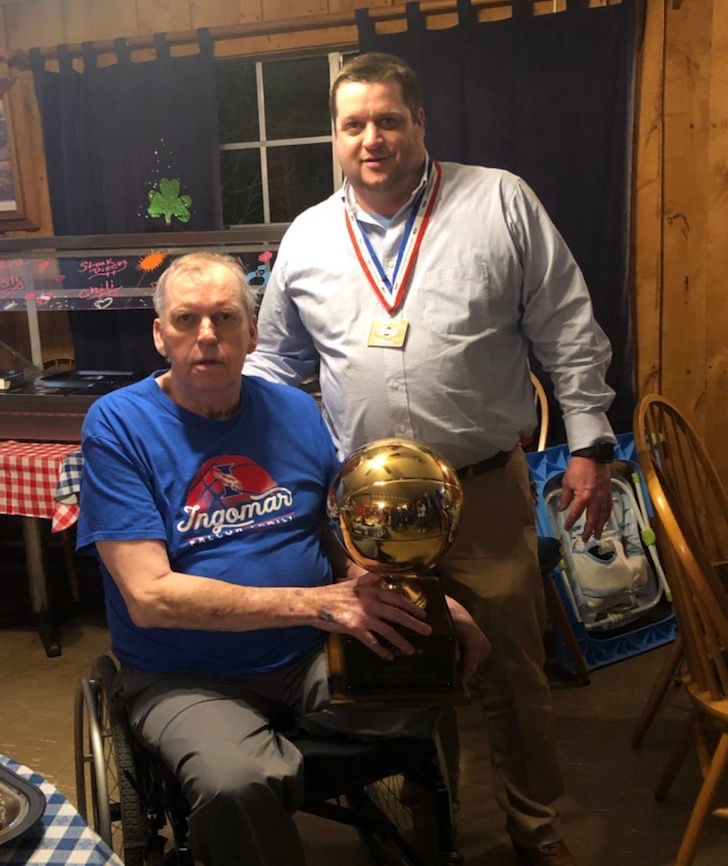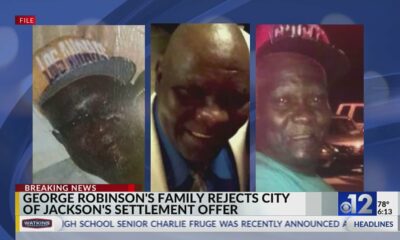Mississippi Today
Norris Ashley: You may not have known him, but think ‘Hoosiers’

Norris Ashley: You may not have known him, but think ‘Hoosiers'
Norris Ashley died last week, and, sadly, many readers will not know of him. You should.
Norris Ashley, 75, was a high school coach, a truly great one, for Ingomar Attendance Center in Union County. That's up in Mississippi's Hill Country, where basketball is king and where the really successful coaches are worshiped almost as deity. Ashley won 1,697 games and nine state championships in 43 years of coaching — 41 were at Ingomar, his alma mater.
Most of you who don't know about Ashley will know about Norman Dale, the character Gene Hackman played in the iconic 1986 movie “Hoosiers.” In the movie, Dale coached tiny Hickory to the overall Indiana state basketball championship against all odds. Simply put, Norris Ashley was Mississippi's Norman Dale.
“I've watched that movie at least 10 times, probably more,” Ashley once told me. “That one hits pretty close to home.”
In 1978, back when Mississippi public high schools still played the Grand Slam, matching the champions of all the high school classifications, tiny Ingomar, with 150 students in grades 9-12, won the Slam defeating much larger schools. James Green, who was listed at 6 feet, 2 inches tall, but might have been 6-1 in his sneakers, was Ingomar's tallest player.
“They listed me at 6-2 because it sounded better,” Green said last week. “We weren't very big but we knew how to play. We had played together for Coach Ashley since we were in junior high. When I say we knew how to play, I mean we really knew how to play.”
As all of Ashley's Ingomar teams did. They guarded fiercely, shared the basketball and took only the best shots. Ashley once said of that team, “We sure don't make anybody shake in their sneakers. We don't have a lot of height, jumping ability or physical strength, and we're not eat up with a lot of quickness either. Sometimes when we play teams that haven't seen us, by the time they stop laughing at us, they're too far behind to catch up.”
Those Ingomar Falcons won 47 consecutive games over two seasons.
The first time these eyes ever saw Norris Ashley was when he played basketball at Delta State. He scored a basket at the buzzer to help the Statesmen defeat Southern Miss. He was a 6-4 forward who could jump into the rafters. In his last game for Delta State, he scored 24 points and grabbed 20 rebounds. He also played left field for Boo Ferriss, another Mississippi treasure, in baseball. He played on Boo's 1968 team that lost in the national championship game of the Division II World Series. Says Langston Rogers, then DSU's sports information director and now a Mississippi Sports Hall of Famer, “Norris was just a phenomenal athlete. At Union College in Jackson, Tennessee, I saw him rob a home run. I mean he must have jumped four feet high over the fence to reach up and grab that ball.”
Ashley was nicknamed “Stalk” at early age by a cotton-farming uncle who said every time he saw his nephew he had grown a few inches just like one of his cotton stalks.
After Ashley graduated from Delta State and coached the DSU freshman team one season, he coached two years at Coahoma High School before returning home to Ingomar. Ashley once recalled an older coach advising him to take the Ingomar job, saying it would be a good place to coach a year or two before he found something better. Said Ashley, four decades later, “I never found any place better.”
James Green, who played at Ole Miss and once coached Southern Miss to the Conference USA championship when the league included Louisville, Memphis, Cincinnati and Houston, believes Ashley would have been successful at any level. “He would have hated recruiting but he could coach with anybody,” Green said. “He was as fundamentally sound as any coach anywhere. He was my John Wooden.”
Ashley's son, Jonathan Ashley, now coaches Ingomar on the basketball floor that is named for his father. Jonathan's Ingomar Falcons won a state championship in 2020 with his father cheering from the stands. “People tell me my teams play like his did,” Jonathan Ashley told me. “For me, that's the ultimate compliment.”
Through all the nearly 1,700 victories and nine state championships, Norris Ashley remained as humble and endearing as he was when he graduated from Ingomar at age 16.
“I guess I had a little influence,” he said upon retirement in 2012. “I got them to the game on time and made sure they had shoes and uniforms and stuff to wear. I've been lucky to have players who worked hard and wanted to win.”
Ashley's funeral will be held Tuesday, appropriately, in the gym on the hardwood that bears his name. The place will be packed as it was for so many of those 1,697 victories. Surely the good people in Ingomar will see fit to name the gym after him, as well.
This article first appeared on Mississippi Today and is republished here under a Creative Commons license.
Did you miss our previous article…
https://www.biloxinewsevents.com/?p=209405
Mississippi Today
Senate confirms Gov. Tate Reeves’ economic development chief despite report of toxic workplace, claims of harassment
The Mississippi Senate on Wednesday unanimously confirmed Bill Cork as Gov. Tate Reeves' pick for a permanent chief economic development officer, despite a background report provided to senators that he “created a toxic workplace” and had faced complaints including sexual harassment and creating a hostile work environment.
In a hearing before his Senate confirmation, Cork said he did nothing wrong, has a winning economic development record, has overhauled MDA.
“… If that takes a little hostility to get that done, that's what's going to happen,” Cork said in the hearing on Tuesday.
Cork is now the first permanent director of the state's economic development agency since 2021, when former agency director John Rounsaville resigned after sexual misconduct allegations.
Cork is credited with recently helping the state land record-setting large economic developments, including Amazon Web Services' commitment to spend $10 billion to construct two “hyperscale data centers” in Madison County.
A background report provided to the Senate Finance Committee before members voted to confirm him said that Cork, who has worked at MDA since September of 2020, was investigated by the Mississippi Personnel Board in 2021. The investigation followed a claim against Cork of sexual harassment, age discrimination and creating a hostile work environment while he was serving as chief economic development officer at MDA.
The personnel board said it conducted the investigation at Gov. Reeves' request. It submitted a report to Reeves after the investigation that said Cork had been uncooperative with the investigation, and that while no legal violations were found, “Cork's management style has created a toxic workplace.” Personnel recommended Cork receive a written reprimand and that he complete at least 12 hours of training on workforce harassment, which he completed.
Cork was traveling Thursday, his office said, and could not be reached for comment. In a Senate Finance confirmation hearing on Wednesday, Cork addressed the report after Sen. Bradford Blackmon asked about it.
Cork said he helped lead “reorganizing and reforming” MDA, resulting in two-thirds of the project management and international teams leaving the agency, and “we had a small cadre of employees that didn't like what was happening.”
“At the end of the day, the state Personnel Board found I hadn't done anything illegal, but that I was a tough boss,” Cork said. “Some people find that level of tough and directedness to be a little hostile. None of it was directed at anyone, but when you're trying to put together a winning team, you just don't settle for second-place.
“… I don't apologize for anything I've done because I didn't do anything wrong,” Cork said. “I didn't cooperate with the investigation because I didn't do anything wrong, and that's exactly what that investigation found.”
State Personnel Director Kelly Hardwick said: “Regretfully, (Cork) didn't cooperate with the investigation, which might have changed our determination. Because he didn't, we were left with only the testimony of the accusations.”
Hardwick declined to provide details of the allegations against Cork, and his office would not release its report to Mississippi Today, citing public records exemptions for personnel records.
Hardwick said Cork did successfully complete the state workplace harassment training and implemented some of the practices recommended in the training.
“He's been shown to be successful and there have been no other complaints on him since,” Hardwick said. “From our standpoint he successfully did what we recommended to the governor.”
Both the Senate Finance Committee and full Senate voted unanimously for Cork's confirmation.
Senate Finance Chairman Josh Harkins noted the report said personnel board found no legal violations, and that Cork openly addressed the allegations in committee. He said he received recommendation letters for Cork from across the state and country and, “It's hard to argue with the product MDA has put out in the last few months.”
A spokesman for Reeves praised Cork, said the “old” personnel complaint is not credible and criticized Mississippi Today.
“Bill Cork has gotten better results for the people of Mississippi than almost any other employee of state government in decades,” Reeves Deputy Chief of Staff Cory Custer said in a statement. “… (Cork) opted to make the results of the investigation known, addressed it in detail in his confirmation hearing yesterday, and was then unanimously confirmed. It would not be a surprise to see a biased article that hypes up discredited nonsense, but it would be a disservice to a great, hard-working man.”
Cork has previously served as deputy director and chief economic development officer at MDA. He formerly led the Hancock County Port and Harbor Commission and before that was the CEO of an industrial complex in New Boston, Texas. He is a Marine Corps veteran and received a master of Urban and Regional Planning from the University of Illinois at Urbana-Champaign.
Reeves on Aug. 13, 2021, announced Cork's predecessor, Rounsaville, would be “stepping down” at the end of that month as MDA director to spend more time with his family and less time traveling. Reeves thanked him for his service and wished him well.
But Mississippi Today reported that sexual misconduct allegations had led to Rounsaville's resignation, and that Reeves had in July received a personnel investigation report and recommendation Rounsaville be fired. After that report, Reeves said Rounsaville had been put on administrative leave and removed from day-to-day operations at MDA and that his resignation had been tendered Aug. 13 after an investigation into his conduct.
An allegedly intoxicated Rounsaville allegedly made sexual advances toward three subordinate female MDA employees at a bar in Biloxi while attending a business conference.
This article first appeared on Mississippi Today and is republished here under a Creative Commons license.
Mississippi Today
Her grandfather helped bring Medicaid to Mississippi 55 years ago. Today, she’s pushing for expansion.
Supporters of Medicaid expansion would argue that it is wholly appropriate that Leah Hendrix has recently been a featured speaker in rallies at the state Capitol in favor of providing health care coverage for primarily working poor Mississippians.
No doubt, her activism brings symmetry.
Hendrix, a Jackson mother of four and the wife of a physician, is the granddaughter of Alton Cobb, the state's former longtime state health officer who played a pivotal role in Mississippi opting into the original Medicaid program 55 years ago.
In more recent times, her father, Tim Alford, a Kosciusko physician, was beating the drums in favor of Medicaid expansion longer than almost any other Mississippi health care provider.
“He said he was leaving that to me because no one had listened to him,” she joked in an interview with Mississippi Today this week after one of the Capitol rallies.
Medicaid expansion has become the major focus of a contentious 2024 legislative session, with hundreds of Mississippians, top state business leaders, health officials and even religious leaders publicly advocating at the Capitol for full Medicaid expansion that stands to significantly help the poorest, unhealthiest state in the nation.
For the first time, state lawmakers are earnestly debating expansion. Hendrix has been on the front lines of the fight to get it across the finish line.
“It seems we have been talking about this for more than 13 years,” she said, referring to the fact that the Affordable Care Act was passed in 2010 with the provision allowing Medicaid expansion to cover those earning up to 138% of the federal poverty level or about $20,000 annually for an individual. “But it really has been going on much longer than that. When did Al work on that?”
READ MORE: Top Mississippi business leaders endorse full Medicaid expansion
The story of Alton Cobb and Mississippi's reluctant decision to opt into Medicaid in 1969 is one of an unlikely alliance and political courage by a governor who eschewed his political philosophy to do what he believed was right for the people of Mississippi.
That governor was John Bell Williams. And Cobb, an employee at the state Department of Health who was initially reluctant to take a key position on Williams' staff, helped the governor reach that decision.
“I didn't vote for him,” Cobb told Mississippi Today in 2019, recalling when he was approached to work for Williams. “I think he probably knew that.”
But former U.S. Rep. David Bowen, who had joined Williams' staff, was a friend of Cobb and convinced him of the potential of Williams' health advisory board.
“I wanted to be part of that,” Cobb said.
READ MORE: Is history repeating itself on Medicaid expansion in Mississippi?
The panel held hearings across the state, listening to health care providers and others. Cobb said Williams attended the meetings, though he seldom spoke. He primarily listened.
At the end of the process, Williams informed his staff he was calling a special session to take up the issue of opting into the Medicaid program. That special session lasted from July 22, 1969, until Oct. 10. In the midst of the long and extraordinary session, Hurricane Camille ravaged the Mississippi Gulf Coast.
But by the end, Mississippi opted into the Medicaid program as most other states had already done.
The Williams-backed move was a shock to many political observers. As a U.S. House member prior to being elected governor, Williams had voted against the legislation to create the Medicaid program and had campaigned for governor railing against the excesses of the federal government.
But in a joint session of the Legislature on the first day of the special session, he told members, “In fairness, I must point out that my philosophical reasons for resisting the program as a member of the United States Congress is neither relevant nor applicable to the present issue before us. The program is a reality. It is available to our state and now devolves wholly into a question of whether you, in your wisdom, should determine our participation will be in the best interests of our state and people.”
Back in 1969, Williams' argument for opting into the original Medicaid program sounded much like the one made today for Medicaid expansion. He said the program would provide health care for a segment of the population that needed it, it would help the state's health care providers, and it would benefit the whole state by pumping more funds into the economy.
“Al used to love to tell about becoming John Bell Williams' chief ambassador for starting Medicaid in Mississippi,” Hendrix said. “… After having several meetings, a light came on for Williams.
“… Two opposites politically flew around the state (on the state plane) selling Medicaid,” Hendrix continued. “Al did not like to fly.”
But she added it was “a good example of a politician who did a 180 because it just made economic sense.”
Hendrix said her grandfather, who died in 2021, wanted his support for Medicaid expansion to be included in his obituary.
Hendrix is hopeful that current Mississippi politicians will do as Williams did back in 1969 and set aside their previous political beliefs and do what is right for the people of Mississippi.
“Despite the stereotypes, Medicaid does so much good,” she said. “This is the insurance that helps children who have no other choice. Where are the Beatitudes when our neighbors need them? I will never understand why Mississippi politicians of late have decided we should not expand — turning down millions of federal dollars our state so desperately needs because of politics while we're all still paying into a system that's funding states that did expand.”
Perhaps today's politicians need someone like Alton Cobb to help them reach that decision. Maybe that person is already part of the debate and is advocating for it at the Capitol every day — if only those Mississippi politicians would do like John Bell Williams did in 1969 and listen.
READ MORE: Medicaid expansion negotiators still far apart after first public meeting
This article first appeared on Mississippi Today and is republished here under a Creative Commons license.
Mississippi Today
Jackson officials settle lawsuit over George Robinson’s death
The family of a Jackson man who died in 2019 days after an interaction with police officers will receive nearly $18,000 in a wrongful death lawsuit settlement.
That $17,786.25 settlement, according to city council documents, “does not constitute an admission of liability” by the city of Jackson and the three former Jackson police officers who the family say pulled 62-year-old George Robinson from his car and beat him in the Washington Addition neighborhood.
Robinson died days later on Jan. 15, 2019, and the state medical examiners said his death was a homicide from three blunt head injuries.
One of the officers, former detective Anthony Fox, was convicted of culpable-negligence manslaughter in 2022, receiving a 20-year sentence with 15 years suspended. Charges against the other two officers, Desmond Barney and Lincoln Lampley, were dismissed in 2021.
Fox's conviction stood for about two years, until January when the Mississippi Court of Appeals reversed the conviction and issued an acquittal. In a majority opinion, the judges agreed the evidence was insufficient for the verdict and that Robinson's medical history made it difficult to tell whether his injuries from Fox was the sole contributor to his death.
The Hinds County district attorney did not support challenging the conviction, while Attorney General Lynn Fitch asked for it to be reversed.
Fox left prison in February and went back to work for the Clinton Police Department, where he was employed up until his conviction after leaving the Jackson Police Department.
Bettersen Wade, Robinson's sister who was a plaintiff in the wrongful death lawsuit, is also the mother of 37-year-old Dexter Wade, the Jackson man who died last year and was buried in the Hinds County pauper's grave, despite having identification and his family calling the coroner's office and Jackson police.
This article first appeared on Mississippi Today and is republished here under a Creative Commons license.
-
Mississippi News6 days ago
What this means for local schools
-
228Sports4 days ago
From Heartbreak to Hoop Dreams: Pascagoula Panthers Springboard from Semifinal Setback to College Courts
-
Mississippi News4 days ago
2 dead, 6 hurt in shooting at Memphis, Tennessee block party: police
-
Mississippi News6 days ago
Willis Miller sentenced to 45 years in prison, mandatory
-
Mississippi News3 days ago
Forest landowners can apply for federal emergency loans
-
Mississippi Today6 days ago
The unlikely Mississippi politician who could tank Medicaid expansion
-
Mississippi News5 days ago
Burnsville man arrested in Prentiss County on drug related charges
-
Mississippi News2 days ago
Cicadas expected to takeover north Mississippi counties soon



































